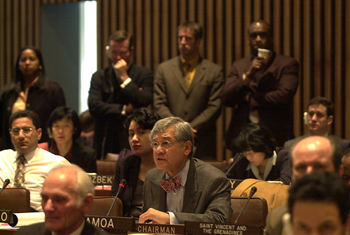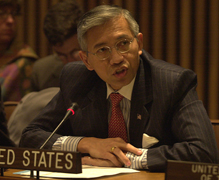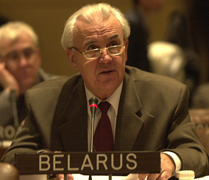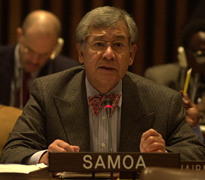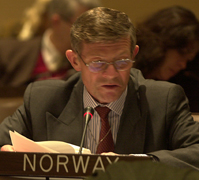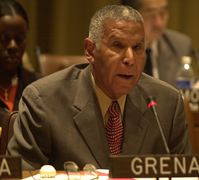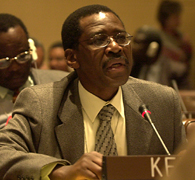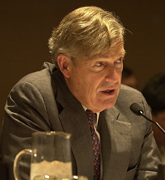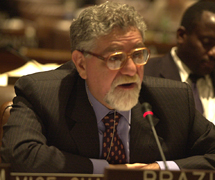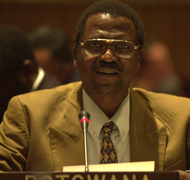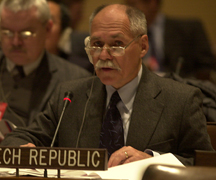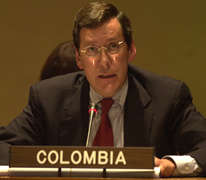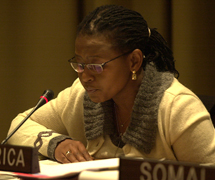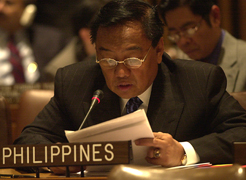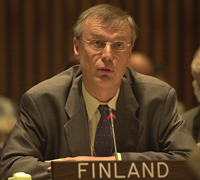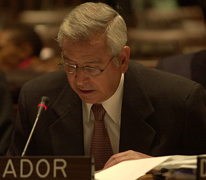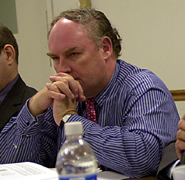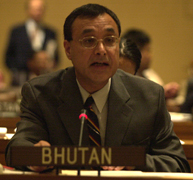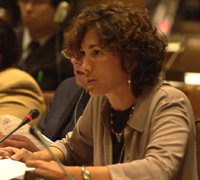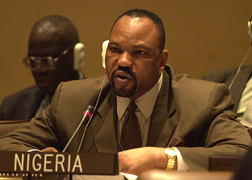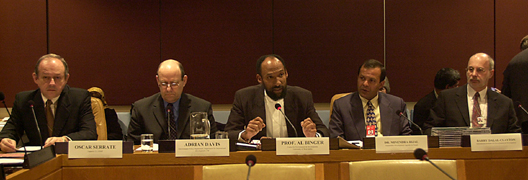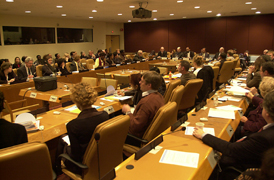|
|
Statements
by delegations on the main themes of the Report of the
Secretary-general
|
|
 Sichan Siv, United States, said that, in the US,
"coalitions of the willing"-between government
at all levels, NGOs, business, indigenous groups, and other
stakeholders-is the most effective way to pursue sustainable
development. Regarding the Secretary-General's report, he,
inter alia: called for inclusion of issues related
to national and local issues of governance; supported calls
by other countries to focus more on oceans and the marine
environment; and said each theme should address science,
education and capacity building.
Sichan Siv, United States, said that, in the US,
"coalitions of the willing"-between government
at all levels, NGOs, business, indigenous groups, and other
stakeholders-is the most effective way to pursue sustainable
development. Regarding the Secretary-General's report, he,
inter alia: called for inclusion of issues related
to national and local issues of governance; supported calls
by other countries to focus more on oceans and the marine
environment; and said each theme should address science,
education and capacity building. |
|
|
Sergei Ling, Belarus, recalled the devastating
effects of the Chernobyl disaster, and said prevention
of reoccurrence of similar catastrophes is vital, and
proposed further strengthening the mechanisms of international
cooperation in addressing environmental disasters.
|
|
|
 Tuiloma Neroni Slade, Samoa, intervenes on behalf of
the Alliance of Small Island States (AOSIS), noted the
major risk that climate change represents to SIDS, and stated,
"climate change is not of our doing, and we look to
the international community for action." He expressed
dismay that some industrial countries seem indifferent to
the fact that lives are at risk because of unsustainable
energy consumption in the North - consumption he qualified
as an addiction. He called for innovative use of debt, notably
debt swaps, to finance economic development and environmental
protection.
Tuiloma Neroni Slade, Samoa, intervenes on behalf of
the Alliance of Small Island States (AOSIS), noted the
major risk that climate change represents to SIDS, and stated,
"climate change is not of our doing, and we look to
the international community for action." He expressed
dismay that some industrial countries seem indifferent to
the fact that lives are at risk because of unsustainable
energy consumption in the North - consumption he qualified
as an addiction. He called for innovative use of debt, notably
debt swaps, to finance economic development and environmental
protection. |
| |
Gunnar H. Lindeman, Norway, stressed focusing on
health, and said links between environmental health and
poverty should be further explained. In this context,
he said the global chemical agenda should be given higher
prominence, and air pollution addressed more systemically.
He said the Secretary-General's report on "Oceans"
focuses one-sidedly on protection and conservation, and
said that fisheries and other marine industries represent
an important but somewhat underutilized source of income
for coastal population of developing countries. He noted
that Norway plans to increase their ODA to 1% of GDP.
He also said the role of women and of indigenous peoples
and local communities should be given higher prominence.
|
|
|
 Lamuel A. Stanislaus, Grenada, on behalf of the Caribbean
Community (CARICOM), stressed the theme of "Partnership"
in the WSSD, and highlighted areas of particular concern
to SIDS. He supported. inter alia, inclusion of "Oceans
and Seas" and "SIDS" as priority areas; a
special fund for the mitigation and rehabilitation of SIDS
following natural disasters; a global sustainable energy
programme; and specially earmarked revolving financial mechanisms
to revitalize rural productive capacity.
Lamuel A. Stanislaus, Grenada, on behalf of the Caribbean
Community (CARICOM), stressed the theme of "Partnership"
in the WSSD, and highlighted areas of particular concern
to SIDS. He supported. inter alia, inclusion of "Oceans
and Seas" and "SIDS" as priority areas; a
special fund for the mitigation and rehabilitation of SIDS
following natural disasters; a global sustainable energy
programme; and specially earmarked revolving financial mechanisms
to revitalize rural productive capacity. |
|
|
|
Bob F. Jalang'o, Kenya, called for strengthening
UNEP. Regarding ongoing discussion on international environmental
governance, he said the interlinkages between environmental
governance and MEAs should be rationalized to avoid duplication
and conflict. He supported elevating Habitat to a UN programme
and called for strengthening the crucial role of local authorities
and their partners in implementing sustainable urbanization.
|
|
|
|
Timothy Wirth, United Nations Foundation, said
the Foundation was established with a $1 billion donation
from Ted Turner and represents the classic public-private
partnership. He noted the Foundation's focus on biodiversity
and climate change and how they impact conditions of poverty,
and highlighted related programmes: the International
Coral Reef Action Network with SIDS and UNEP; a polio
eradication programme particularly focused on Africa;
and the World Heritage Programme, series of private partnerships
working with UNESCO. He also mentioned a grant to DESA
for communications to promote Southern NGO participation
in the Summit and, and the Equator initiative with UNDP.
He hoped the WSSD would look at programmes related to
sustainable energy, and access to energy in new and more
sustainable forms, and said the planets are lined up to
address the nexus of energy, climate change and poverty.
|
| |
 Professor
Celso Lafer, Minister of Foreign Relations, Brazil,
said the Summit will test the capacity of multilateral
action to serve as an effective instrument for promoting
development. He underscored improved market access for
developing countries, particularly liberalization of agriculture
markets, and said the Kyoto Protocol must be put into
force. He suggested that finance and technology transfer
be treated as cross-sectoral issues in discussing the
clusters outlined in the Secretary-General's paper.
Professor
Celso Lafer, Minister of Foreign Relations, Brazil,
said the Summit will test the capacity of multilateral
action to serve as an effective instrument for promoting
development. He underscored improved market access for
developing countries, particularly liberalization of agriculture
markets, and said the Kyoto Protocol must be put into
force. He suggested that finance and technology transfer
be treated as cross-sectoral issues in discussing the
clusters outlined in the Secretary-General's paper.
|
| |
|
Mushanana
L.
Nchunga, Botswana, hoped to emerge
from WSSD with concrete, predictable and time-bound financial
commitments to facilitate the implementation of MEAs, in
particular the CCD, and said the GEF should be further aligned
with the CCD's implementation schedules. He also hoped the
WSSD would strongly affirm that combating HIV/AIDS and other
diseases such as malaria is a key component of sustainable
development. |
| |
 Amraiya
Naidu, Fiji, supported, inter alia: placing oceans
as a stand-alone issue in the WSSD agenda; finalizing the
Global Code of Ethics for Tourism; recognizing social equity
for all, including women, youth and children; a commitment
to convene a ten-year review conference on the Global Programme
of Action for SIDS; and establishment of information and
communications technology mechanisms to cost effectively
connect SIDS with the rest of the world.
Amraiya
Naidu, Fiji, supported, inter alia: placing oceans
as a stand-alone issue in the WSSD agenda; finalizing the
Global Code of Ethics for Tourism; recognizing social equity
for all, including women, youth and children; a commitment
to convene a ten-year review conference on the Global Programme
of Action for SIDS; and establishment of information and
communications technology mechanisms to cost effectively
connect SIDS with the rest of the world. |
| |
 Hasmy
Agam, Malaysia, said the essential task of Johannesburg
is to explore the basis for a renewed global "deal,"
which can underpin all other commitments. He looked forward
to the strengthening of a sustainable development architecture
and said the CSD should be strengthened and serve as a guiding
force in initiating improvements in international relations
and in translating commitments into actions. He said the
key to a successful outcome is the provision for the effect
and efficient means of implementation. Hasmy
Agam, Malaysia, said the essential task of Johannesburg
is to explore the basis for a renewed global "deal,"
which can underpin all other commitments. He looked forward
to the strengthening of a sustainable development architecture
and said the CSD should be strengthened and serve as a guiding
force in initiating improvements in international relations
and in translating commitments into actions. He said the
key to a successful outcome is the provision for the effect
and efficient means of implementation. |
|
|
 Shen Guofang, China, stated that a concrete plan
of action must be put in place and said such a plan should
include elements related to, inter alia: fundamental
principles established at Rio, such as common, but differentiated
responsibilities; global partnership; a favorable external
environment; improved means of implementation; and including
the creativity of major groups.
Shen Guofang, China, stated that a concrete plan
of action must be put in place and said such a plan should
include elements related to, inter alia: fundamental
principles established at Rio, such as common, but differentiated
responsibilities; global partnership; a favorable external
environment; improved means of implementation; and including
the creativity of major groups. |
|
|
 Earl
S. Huntley, Saint Lucia, said that globalization and
trade liberalization are limiting the achievement of sustainable
development for most SIDS. He called for an appropriate
institutional arrangement between the UN and the WTO, urged
going beyond a voluntary code of conduct for businesses,
and called for monitoring of compliance under the auspices
of the UN.
Earl
S. Huntley, Saint Lucia, said that globalization and
trade liberalization are limiting the achievement of sustainable
development for most SIDS. He called for an appropriate
institutional arrangement between the UN and the WTO, urged
going beyond a voluntary code of conduct for businesses,
and called for monitoring of compliance under the auspices
of the UN. |
|
 Bedrich Moldan, the Czech
Republic, stressed that "development"
and "sustainable development" are the same.
He highlighted the following issues as being of of particular
concern: governance; areas such as biodiversity, freshwater
management, and energy, as they touch equally upon all
three pillars of sustainable development; and capacity
building, as well as the role of science, education and
awareness raising. He supported the idea of a "global
deal."
Bedrich Moldan, the Czech
Republic, stressed that "development"
and "sustainable development" are the same.
He highlighted the following issues as being of of particular
concern: governance; areas such as biodiversity, freshwater
management, and energy, as they touch equally upon all
three pillars of sustainable development; and capacity
building, as well as the role of science, education and
awareness raising. He supported the idea of a "global
deal."
|
|
|
 Nicolas
Rivas, Colombia, commented on four aspects which he
believes should be carefully examined: illicit crops; local
communities and indigenous peoples; education for sustainable
development; and trade and environment. He highlighted the
First Regional Workshop on "Car-less Days for Mayors
in Latin America" in collaboration with the Division
of Sustainable Development will be held from 6-8 February,
and will demonstrate how Bogotá is committed to the concept
of sustainable urban transport.
Nicolas
Rivas, Colombia, commented on four aspects which he
believes should be carefully examined: illicit crops; local
communities and indigenous peoples; education for sustainable
development; and trade and environment. He highlighted the
First Regional Workshop on "Car-less Days for Mayors
in Latin America" in collaboration with the Division
of Sustainable Development will be held from 6-8 February,
and will demonstrate how Bogotá is committed to the concept
of sustainable urban transport. |
|
|
 South
Africa said: the structural imbalances in economic power
relations between the North and the South need to be redressed;
social development programmes must address, inter alia,
access to safe water, sanitation and energy for the poor,
increased food security, universal literacy, and a global
attack on HIV/AIDS; and the environment agenda must focus
on the environmental right of the poor. She said a successful
outcome of the WSSD will include a "global deal,"
a concrete Programme of Action; and a range of specific
sectoral agreements, partnerships and action. She reiterated
the Summit's slogan: People, Planet and Prosperity.
South
Africa said: the structural imbalances in economic power
relations between the North and the South need to be redressed;
social development programmes must address, inter alia,
access to safe water, sanitation and energy for the poor,
increased food security, universal literacy, and a global
attack on HIV/AIDS; and the environment agenda must focus
on the environmental right of the poor. She said a successful
outcome of the WSSD will include a "global deal,"
a concrete Programme of Action; and a range of specific
sectoral agreements, partnerships and action. She reiterated
the Summit's slogan: People, Planet and Prosperity.
|
| |
|
Heherson T. Alvarez, the Philippines, supported
the proposal that vital sustainable development technologies
be made more accessible to developing countries at lower
costs and through improved mechanisms. He said migration
still lacks the attention it deserves, highlighting the
issues of brain drain, the growing feminization of migration,
and migrants' workers rights. He hoped the WSSD will consider
migration and development. |
|
|
 Peter Stenlund, Finland, on behalf of the Arctic Council,
noted that the Council represents a unique forum for partnership
between national governments and indigenous peoples in the
Arctic. He noted clusters identified in the Secretary-General's
paper of particular importance to the Council, including:
promoting health; access to energy; sustainable management
of ecosystems and biodiversity; and international governance.
Peter Stenlund, Finland, on behalf of the Arctic Council,
noted that the Council represents a unique forum for partnership
between national governments and indigenous peoples in the
Arctic. He noted clusters identified in the Secretary-General's
paper of particular importance to the Council, including:
promoting health; access to energy; sustainable management
of ecosystems and biodiversity; and international governance.
|
|
|
 Mario
Aleman, Ecuador, said cooperation or the "flowing"
of resources for development, must not be conditioned by
the establishment of environmental standards not applicable
to all countries. He said it was valuable to count on instruments
such as bio-trade projects, and swaps for nature or for
social projects, as well as scientific and recreational
biotourism. He highlighted that Ecuador is considered first
in the world when it comes to biodiversity density.
Mario
Aleman, Ecuador, said cooperation or the "flowing"
of resources for development, must not be conditioned by
the establishment of environmental standards not applicable
to all countries. He said it was valuable to count on instruments
such as bio-trade projects, and swaps for nature or for
social projects, as well as scientific and recreational
biotourism. He highlighted that Ecuador is considered first
in the world when it comes to biodiversity density. |
|
|
|
 Ian Johnson, World Bank, stated that while macro-economic
stability is not sufficient to ensure development, it
is however one of its preconditions. Noting that "the
era of fragmentation is over," he put forth several
conditions that must be met to achieve sustainable development
- among them: increasing ODA, addressing trade barriers
(such as the one billion dollars a day the OECD countries
use to protect their agricultural sectors), and debt relief
as embodied in the Highly Indebted Poor Countries (HIPC)
debt-relief initiative.
Ian Johnson, World Bank, stated that while macro-economic
stability is not sufficient to ensure development, it
is however one of its preconditions. Noting that "the
era of fragmentation is over," he put forth several
conditions that must be met to achieve sustainable development
- among them: increasing ODA, addressing trade barriers
(such as the one billion dollars a day the OECD countries
use to protect their agricultural sectors), and debt relief
as embodied in the Highly Indebted Poor Countries (HIPC)
debt-relief initiative.
|
| |
 The International Monetary Fund (IMF) highlighted
aspects brought up in preparation for the Financing for
Development conference relevant to the WSSD. He said development
strategies need to be country owned and ODA needs to increase.
The International Monetary Fund (IMF) highlighted
aspects brought up in preparation for the Financing for
Development conference relevant to the WSSD. He said development
strategies need to be country owned and ODA needs to increase.
|
| |
|
Lyonpo
Om Pradhan, Bhutan, recalled that this is the International
Year of the Mountains and highlighted the importance of
mountain ecosystems to the global environment and sustainable
development. He supported giving greater prominence to sustainable
mountain development in a future programme of action. He
said Bhutan has largely avoided the great temptation to
undermine its environment and forests for the sake of development
and unsustainable consumption patterns, and has chosen not
to make environment a hostage to development. |
| |
 Stephanie Firestone, Israel, commended the Secretary-General's
report for giving special attention to Africa, and for addressing
sustainable production and consumption patterns, in which,
she said the advertising industry and the media should be
made major partners.
Stephanie Firestone, Israel, commended the Secretary-General's
report for giving special attention to Africa, and for addressing
sustainable production and consumption patterns, in which,
she said the advertising industry and the media should be
made major partners. |
| |
 Irene
Freudenshuss-Reichl, UNIDO, noted industries role as
a major force for development and potentially for environmental
degradation. She highlighted initiatives in the areas of
technology transfer, energy and solid waste that UNIDO will
undertake for Johannesburg
Irene
Freudenshuss-Reichl, UNIDO, noted industries role as
a major force for development and potentially for environmental
degradation. She highlighted initiatives in the areas of
technology transfer, energy and solid waste that UNIDO will
undertake for Johannesburg |
| |
|
Ositadinma
Anaedu, Nigeria, supported strengthening
UNEP in the context of international environmental governance,
with due respect to the mandates of MEAs, but at the same
time, said that an institutional arrangement for governance
of sustainable development with the capacity to facilitate
WSSD outcomes. He stressed the need to clearly identify
the role and status of UNDP in the overall governance of
sustainable development. |
| |
 The Joint United Nations Programme on HIV/UNAIDS said
that since Rio, the HIV/AIDS pandemic has progressed to
become the most devastating disease humankind has ever face,
sparing no country, group or social class. He said new strategies
and actions to be elaborated at WSSD for the further implementation
of Agenda 21 should take into account the following elements:
HIV/AIDS should be an integral part of all national poverty
reduction strategies, and sustainable development and economic
growth strategies; a multisectoral response to HIV/AIDS/
conserving scarce human resources; sustaining and strengthening
debt relief efforts; increased international assistance
and solidarity; and building partnerships in response to
HIV/AIDS.
The Joint United Nations Programme on HIV/UNAIDS said
that since Rio, the HIV/AIDS pandemic has progressed to
become the most devastating disease humankind has ever face,
sparing no country, group or social class. He said new strategies
and actions to be elaborated at WSSD for the further implementation
of Agenda 21 should take into account the following elements:
HIV/AIDS should be an integral part of all national poverty
reduction strategies, and sustainable development and economic
growth strategies; a multisectoral response to HIV/AIDS/
conserving scarce human resources; sustaining and strengthening
debt relief efforts; increased international assistance
and solidarity; and building partnerships in response to
HIV/AIDS. |
|
|
|
Over
the weekend, Chair Salim will prepare a list of issues
raised during the week, and it will be made available
at 5pm on Sunday, 3 February, and will be posted on Official
WSSD website at http://www.johannesburgsummit.org.
Two interactive dialogue sessions will begin on Monday.
|
|
|

